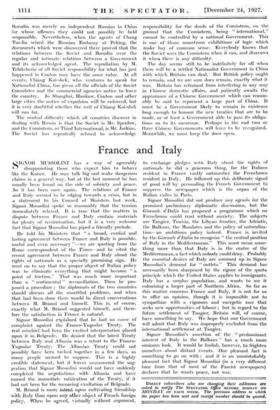France and Italy s IGNOR MUSSOLINI has a way of agreeably
disappointing those who expect him to behave like the Kaiser. He may talk big and make dangerous claims in a general way, but at the last moment he has usually been found on the side of sobriety and peace. So it has been once again. The relations of France and Italy seemed to be edging towards a crisis, but in a statement to his Council of Ministers last week, Signor Mussolini spoke so reasonably that the tension immediately relaxed. It is true that the matters in dispute between France and Italy contain materials for plenty of recrimination, but it is a very welcome fact that Signor Mussolini has piped a friendly prelude.
He told his Ministers that "a broad, cordial and lasting agreement between France and Italy is possible, useful and even necessary "—we are quoting from the Rome correspondent of the Times—and he cited the recent agreement between France and Italy about the rights of nationals as a specially promising sign. He went on to say that the proper object of Italian policy was to eliminate everything that might become "a point of friction." That was much more important than a " sentimental " reconciliation. Then he pro- posed a procedure ; the diplomats of the two countries should discuss all the unsettled problems, and when that had been done there would be direct. conversations between M. Briand and himself. This is, of course, exactly what M. Briand suggested himself, and there- fore the satisfaction in Fmnce is natural.
Signor Mussolini evlained that he had no cause of complaint against the Franco-Yugoslav Treaty. The real mischief had been the excited interpretation placed upon it in Belgrade. He denied that the latest Treaty between Italy and Albania was a retort to the Franco- Yugoslav Treaty. The Albanian Treaty could not possibly have been tacked together in a few days, as many people se.emed to suppose. This is a highly credible statement, but it leaves unanswered the sug- gestion that Signor Mussolini would not have suddenly completed the negotiations with Albania and have caused the immediate ratification of the Treaty, if it had not been for the menacing exultation of Belgrade.
M. Briand is more intent upon cultivating friendship with Italy than upon any other object of French foreign policy. -When he agreed, virtually without argument, to exchange pledges with Italy about the rights of nationals he did a generous thing, for the Italians resident in France vastly outnumber the Frenchmen resident in Italy. He followed up this deliberate signal of good will by persuading the French Government to suppress the newspaper which is the organ of the Italian exiles- in Paris.
Signor Mussolini did not produce any agenda for the promised preliminary diplomatic discussions, but the Giornale d'Italia has proposed a programme which no Frenchman could read without anxiety. The subjects• are Tangier, Tunisia, the Libyan frontier, the Adriatic, the Balkans, the Mandates and the policy of naturaliza- tion—an ambitious policy indeed. France is invited by the Giornale &Italia to recognize " the central position of Italy in the Mediterranean." This must mean some- thing more than that Italy is in the centre of the Mediterranean, a fact which nobody could deny. Probably the essential desires of Italy are summed up in Signor Mussolini's demand for " outlets." This demand has necessarily been sharpened by the rigour of the quota principle which the United States applies to immigrants.
Italy has a surplus population, and wants to see it colonizing a larger part of Northern Africa. So far as this matter concerns France and Italy, it is not for us to offer an opinion, though it is impossible not to sympathize with a vigorous and energetic race that seeks new opportunities of labour ; but in regard to the future settlement of Tangier, Britain will, of course, have something to say. We hope that our Government will admit that Italy was improperly excluded from the international settlement at Tangier.
Signor Mussolini's assertion of the "predominant interest of Italy in the Balkans" has a much more ominous look. It would be foolish, however, to frighten ourselves about distant events. One pleasant fact is something to go on with ; and it is an unmistakably pleasant fact that Signor Mussolini (in a very different tone from that of most of the Fascist newspapers) declares that he wants peace, not war.






























 Previous page
Previous page